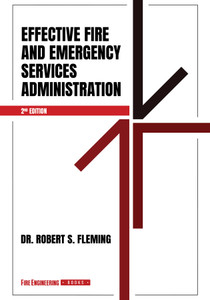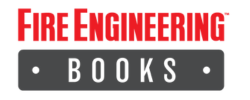
Effective Fire and Emergency Services Administration, 2nd edition - eBook
Robert S. Fleming, Ed.D.Effective Fire and Emergency Services Administration, 2nd edition
Effective Fire and Emergency Services Administration, 2nd Ed. prepares individuals for successful careers in fire and emergency services administration, examining critical areas such as:
- Effective Management and Leadership: Get insights into essential management functions, leadership development, and the transition from firefighter to officer roles.
- Organizational Challenges and Planning: Learn how to address contemporary challenges in fire and emergency services, including stakeholder expectations, environmental scanning, and strategic planning.
- Human Resources and Professional Development: Explore the nuances of managing personnel, career advancement, recruitment, retention, and the importance of ongoing training and certification.
- Communication and Decision-Making: See how effective communication can positively impact decision-making processes and drive problem-solving strategies in both administrative and emergency scenarios.
- Resource and Risk Management: Discover how to manage physical, financial, and human resources, while also addressing safety, health, wellness, and risk management in fire services.
Whether you're working toward career advancement or currently serving in an administrative role, this book equips both you and the organizations you lead for success. It’s a valuable resource for students, personnel, and operational and administrative officers looking to excel in leadership and prepare for promotional exams.
Written by Robert S. Fleming, a highly respected expert with over 50 years of experience in fire and emergency services, this book and the previous edition reflect his extensive knowledge in organizational effectiveness and leadership development.
*****
Table of Contents
Foreword
Preface
About the Author
1. Challenges and Expectations for Contemporary Fire and Emergency Services Organizations
Opening Scenario
Chapter Objectives
Introduction
Organizational Stakeholders and Their Expectations
- Products and Services
- Challenges to Service Delivery
- Stakeholder Expectations
- Business Framework
- Staffing Models for Volunteer, Combination, and Career Organizations
- Organizational Performance Measures
Organizations as Systems
- Systems Approach
- External Environment
Organizational Planning Approaches
Environmental Scanning
SWOT Analysis
Closing Scenario
Summary
Key Terms
Case Study
Case Questions
Questions
Projects
Notes
2. Preparing for Success in Fire and Emergency Services Administration
Opening Scenario
Chapter Objectives
Introduction
Managerial Skills
- Levels of Management
- Types of Managerial Positions
- Types of Positions
- Managerial Roles
- Role Theory
- Role-Related Issues
Career Opportunities and Advancement
- Making the Transition: Firefighter to Line Officer
- Making the Transition: Line Officer to Chief Officer
- Fire and Emergency Services Training
- Fire and Emergency Services Certification
- Higher Education Opportunities
- The Fire Service as a Profession
- Professional Development
Closing Scenario
Summary
Key Terms
Case Study
Case Questions
Questions
Projects
Notes
Recommended Reading
3. Management Theory and Practice
Opening Scenario
Chapter Objectives
Introduction
Evolution of Management Theory
- Why Study Management Theory
- The Evolution of Management Theory and Practice
- Classical Management Approach
- Behavioral Management Approach
- Management Science Approach
Contemporary Management Approaches
Essential Management Concepts
- Division of Labor
- Labor Specialization
- Organizational Structure
- Chain of Command
- Unity of Command
- Span of Control
- Centralization versus Decentralization
- Delegation
Managing People and Tasks
- The Managerial Grid
Closing Scenario
Summary
Key Terms
Case Study
- Case Questions
Questions
Project
Notes
4. Management Functions and Managerial Success
Opening Scenario
Chapter Objectives
Introduction
The Management Functions
The Planning Function
The Strategic Planning Process
- Preparation Phase
- Planning Phase
- Implementation Phase
The Organizing Function
The Directing Function
The Controlling Function
Closing Scenario
Summary
Key Terms
Case Study
- Case Questions
Questions
Note
Projects
Recommended Reading
5. Leadership, Personal, and Organizational Effectiveness
Opening Scenario
Chapter Objectives
Introduction
Management versus Leadership
- Individual Behavior
- Group Behavior
- Group Development Stages
- Group Dimensions
- Developing Management and Leadership Skills
- Sources of Power
- Becoming a Manager/Leader
Leadership Theory and Practice
- Trait Theories
- Behavioral Theories
- Contingency Theories
Organizational Culture
Managing Change
- Organizational Change
- Change Management Processes and Strategies
Closing Scenario
Summary
Key Terms
Case Study
- Case Questions
Questions
Projects
Recommended Reading
Notes
6. Ensuring Communication Effectiveness
Opening Scenario
Chapter Objectives
Introduction
Purpose of Communication
The Role of Organizational Communication
- Stakeholder Expectations for Communication
The Communication Process
- Types of Communication
- Forms of Communication
- Communication Patterns, Context, and Logistics
Communication Effectiveness
- Barriers to Effective Communication
- Increasing Communication Effectiveness
- Communicating through Effective Presentations
- Communicating through Informative and Persuasive Press Releases
Closing Scenario
Summary
Key Terms
Case Study
- Case Questions
Questions
Projects
Recommended Reading
Note
7. Decision-Making, Problem-Solving, and Information Management
Opening Scenario
Chapter Objectives
Introduction
Decision-Making and Problem-Solving
Information Management
- Data and Information
- Documentation and Records Management
- Information Systems
Making Informed Decisions
- Programmed and Nonprogrammed Decisions
- Individual versus Group Decision-Making
- Decision-Making Process
Solving Challenging Problems
- Managing Complaints
- Managing Conflict
Closing Scenario
Summary
Key Terms
Case Study
- Case Questions
Questions
Projects
8. Human Resource Management
Opening Scenario
Chapter Objectives
Introduction
- The Role of Human Resources in Organizational Success
- Human Resource Management
Strategic Human Resource Management
- Human Resource Management Activities
- Human Resource Planning
- Recruiting Personnel
- Motivating and Empowering Personnel
- Retaining Personnel
Maximizing Personnel Effectiveness
- Training and Development Activities
- Performance Evaluation
- Discipline
Labor–Management Relations
- Labor–Management Process
Closing Scenario
Summary
Key Terms
Case Study
- Case Questions
Questions
Projects
Notes
9. Managing Physical and Financial Resources
Opening Scenario
Chapter Objectives
Introduction
Managing Physical Resources
- Facilities
- Apparatus
- Equipment
- Personal Protective Equipment
- Materials and Supplies
Managing Financial Resources
- The Budgeting Process
Closing Scenario
Summary
Key Terms
Case Study
- Case Questions
Questions
Projects
Notes
Recommended Reading
10. Venues of Fire and Emergency Services Administration
Opening Scenario
Chapter Objectives
Introduction
Managing Off and On the Incident Scene
Health and Safety
- Line-of-Duty Deaths
Preincident Planning
- Preplan Components
Incident Management
- Incident Action Plans
- Incident Management Priorities
- Incident Scene Safety
- Incident Management System
Closing Scenario
Summary
Key Terms
Case Study
- Case Questions
Questions
Projects
Recommended Reading
Notes
11. Contemporary Issues in Fire and Emergency Services Administration
Opening Scenario
Chapter Objectives
Introduction
Contemporary Management Issues
Managing and Leading
Responsible Leadership
- Integrity and Ethics
- Diversity, Equity, and Inclusion
- Social Responsibility
- Reputation Management
- Safety, Health, and Wellness
- Stewardship
- Managing Human Resources
- Managing Financial Resources
- Managing Physical Resources
- Time Management
- Risk Management
Closing Scenario
Summary
Key Terms
Case Study
- Case Questions
Questions
Projects
Notes
Recommended Reading
12. Preparing Yourself and Your Organization for Future Success
Opening Scenario
Chapter Objectives
Introduction
- Understanding and Addressing the Fire Problem
- Understanding and Addressing Stakeholder Expectations
- Community Risk Assessment
- Evaluating Fire and Emergency Services
Working with Stakeholder Groups
- Working with Internal Stakeholders
- Working with Elected and Appointed Officials
- Working with the Public
- Working with the Media
- Working with Other Agencies
The Future of Fire and Emergency Services
- Preparing and Positioning Your Organization for the Future
- Preparing Yourself for the Future
Closing Scenario
Summary
Key Terms
Case Study
- Case Questions
Questions
Projects
Recommended Reading
Notes
Appendixes
A Fire and Emergency Services Higher Education Professional Development Models
B Fire and Emergency Services Higher Education Correlation Matrix
C Listing of Relevant National Fire Protection Association Standards
D Fire and Emergency Services Organizations
Glossary
Index
- Format:
- eBook
- Number of Pages:
- 358
- Published Date:
- October 2024
- ISBN:
- E9781593706111






